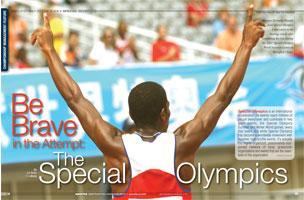
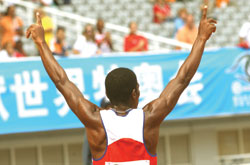 Special Olympics is an international organization. Its events reach millions of people every year and culminate in two giant events, the Special Olympics Summer and Winter World games, every four years. But while Special Olympics has become a worldwide movement with massive, high-profile events, it's actually the highly organized, passionately supported network of local, grassroots organizations and events that are the heartbeat of this organization.
Special Olympics is an international organization. Its events reach millions of people every year and culminate in two giant events, the Special Olympics Summer and Winter World games, every four years. But while Special Olympics has become a worldwide movement with massive, high-profile events, it's actually the highly organized, passionately supported network of local, grassroots organizations and events that are the heartbeat of this organization.
On any given day in America and in countries across the globe, some Special Olympics event is going on. Whether it's a track and field event at a local high school stadium, a regional softball tournament or a fundraiser led by policemen who have pledged to sleep on top of a donut shop, Special Olympics is a movement made possible - and made truly alive - by thousands of communities and the people who call them home.
Dignity, Acceptance and the Human Race
"Let me win. But if I cannot win, let me be brave in the attempt." This is the motto of Special Olympics athletes, a credo that has inspired thousands of communities to support the organization and millions of athletes to participate, despite whatever challenges they might face.
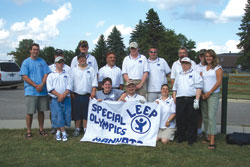 For many years, no opportunity existed for people with intellectual disabilities to compete in athletic events. All that changed in 1963 when Eunice Kennedy Shriver started a summer day camp where children and adults with intellectual disabilities could experience sports and physical activities. In 1968, Special Olympics made its official start as an "international nonprofit organization dedicated to empowering individuals with intellectual disabilities to become physically fit, productive and respected members of society through sports training and competition."
For many years, no opportunity existed for people with intellectual disabilities to compete in athletic events. All that changed in 1963 when Eunice Kennedy Shriver started a summer day camp where children and adults with intellectual disabilities could experience sports and physical activities. In 1968, Special Olympics made its official start as an "international nonprofit organization dedicated to empowering individuals with intellectual disabilities to become physically fit, productive and respected members of society through sports training and competition."
Today, Special Olympics offers children and adults with intellectual disabilities year-round training and competition in 30 Olympic-type summer and winter sports. Special Olympics is open to participants ages eight and up, and the organization recently launched the Young Athletes Program, combining sports and developmentally appropriate play for children with intellectual disabilities ages two to seven.
The organization asserts that the self-confidence, self-esteem, employment and socialization gains Special Olympics athletes achieve resonate in their lives well beyond the actual athletic events themselves, and research supports that claim: more than half (52 percent) of adult Special Olympics athletes have jobs, while employment rates as low as 10 percent have been cited for the general population of people with intellectual disabilities.
What are Intellectual Disabilities?
Special Olympics serves athletes with intellectual disabilities, defined by the American Association of Intellectual and Developmental Disabilities (AAIDD) based on the following three criteria:
Intellectual functioning level (IQ) below 70-75
Significant limitations in two or more adaptive skill areas, skills needed to live and participate in the community.
The condition manifests itself before the age of 18.
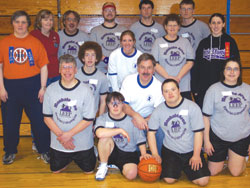 Intellectual disabilities know no border, no language and no boundary. According to the World Health Organization, up to three percent - almost 200 million people - have intellectual disabilities. Special Olympics currently serves 2.5 million people with intellectual disabilities in more than 200 programs in over 180 countries, including more than 500,000 athletes in China, more than 210,000 in India, almost 550,000 in the United States, more than 600 in Afghanistan and 4,400 athletes in Rwanda.
Intellectual disabilities know no border, no language and no boundary. According to the World Health Organization, up to three percent - almost 200 million people - have intellectual disabilities. Special Olympics currently serves 2.5 million people with intellectual disabilities in more than 200 programs in over 180 countries, including more than 500,000 athletes in China, more than 210,000 in India, almost 550,000 in the United States, more than 600 in Afghanistan and 4,400 athletes in Rwanda.
Special Olympics has also worked to shape community awareness of their mission, moving the public toward a true understanding of the critical social change that Special Olympics games catalyze. The 2007 Special Olympics World Summer Games in Shanghai, China, offers the perfect example.
Inspired by their work to bring the Special Olympics to China, Shanghai's government and community came together prior to the arrival of the Games to build a"Sunshine Home"- a place where people with intellectual disabilities could go for social and physical recreation and computer and life skills training.
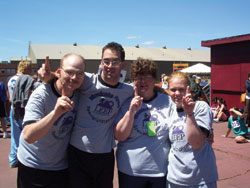 Shanghai's Sunshine Home was just the beginning, though. Following the Chinese community's monumental reaction to the Games, similar Sunshine Homes have been started throughout the country.
Shanghai's Sunshine Home was just the beginning, though. Following the Chinese community's monumental reaction to the Games, similar Sunshine Homes have been started throughout the country.
"[This resource] is really quite powerful for someone with intellectual disabilities," says Lee Todd, Special Olympics Chief of World Games and Competition. "They may not have the ability to socialize, which comes with ease for many of us. They end up just sitting at home all day watching TV. Sunshine Homes bring them out – get them socializing and exercising. They expand their frontiers, and open up a whole new part of their lives."
As an organization, Special Olympics knows that change starts not with the World Games, but within each community. That's why local, state and regional Special Olympics groups are the heart of the organization.
From the Community Up
In North America alone, there are more than72 Special Olympics programs, and while they are all united in the same mission and vision, each community puts its own unique organizational stamp on its Special Olympics program.
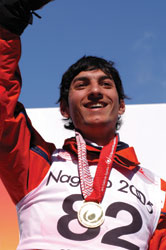 In Dothan, Alabama, Special Olympics is organized by the city's Therapeutic Recreation Program.
In Dothan, Alabama, Special Olympics is organized by the city's Therapeutic Recreation Program.
"Our city is so supportive," says Angie Lowe, recreation manager, Dothan Leisure Services Department. "Not only do they provide the facilities, but they're also eager to host any event.They're so determined to give our city's athletes with intellectual disabilities the same opportunities as everyone else."
Dothan offers year-round training and events in a variety of sports, and the Dothan Houston County Special Olympics Track & Field Day has grown to be a must-attend event for the whole area. The Dothan Police Department takes charge of the Flame of Hope, starting their relay run long before the opening ceremony starts and ending it by handing the Flame down a long line of the athletes' parents. The parents pass the torch to a small group of athletes who use it to light the cauldron, eliciting a giant cheer from the crowd.
While the Track & Field Day is a centerpiece of Dothan's program, the community works hard all year long to supply uniforms, purchase equipment, pay for trips to out-of-town competitions and provide ongoing sports experiences to its Special Olympics athletes. The Dothan police department even set a record for Special Olympics fund raising.
"Several of the police, they camp out on top of Krispy Kreme for three days, broadcast the whole thing on the radio and encourage the community to come down and donate," says Lowe. "The first year they raised the most money of any single event in the U.S."
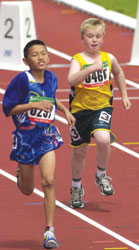 The community's support has contributed to making Dothan's Special Olympics athletes and program a great success. They've hosted a number of statewide and regional events; their 2006 volleyball team took gold in the U.S. nationals; and in 2003, two Dothan athletes went to the World Games in Ireland.
The community's support has contributed to making Dothan's Special Olympics athletes and program a great success. They've hosted a number of statewide and regional events; their 2006 volleyball team took gold in the U.S. nationals; and in 2003, two Dothan athletes went to the World Games in Ireland.
In Mankato, Minnesota, the Special Olympics program is coordinated by LEEP (Leisure Education for Exceptional People), a nonprofit that provides recreation and leisure activities to people with disabilities. Mankato has one of the largest Special Olympics teams in Minnesota, with 300 athletes participating in 15 different sporting opportunities all year long.
"Basically we run each of our sports seasons similar to a regular three-to-four month sports season, with practice weekly," explains Becky Kunst, LEEP's executive director. "We have an area tournament halfway through the season and state tournaments at the end of the season. We're really lucky in Mankato to have eight different teams, but a lot of towns only have one team, so tournaments are important."
While Special Olympics events tend to follow high school regulations whenever possible and most Special Olympics sports events can be held at standard sports facilities, athletes with physical disabilities often require unique facilities. Mankato is home to a new field, the Miracle Field, a handicap-accessible softball field that provides the ideal sports facility for Mankato's Miracle League Baseball teams. And while Special Olympics doesn't typically use a facility like this one, as Kunst puts it, "it's remarkable to live in a community where that kind of facility is available if you ever need it."
Making a World Games Bid
Community events keep Special Olympics alive and growing worldwide, and some communities with strong support and the necessary infrastructure turn their local passion into an opportunity to host the World Games. This February, Boise, Idaho hosts the Winter World Games as they return to the U.S. for the first time since the 2001 Winter Games in Anchorage.
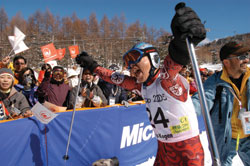 "Boise's leadership was enthusiastic and prepared," says Todd. "They had a sound financial package as well as the right venues, and the city was the right size. In the end, it was the complete package they put together that won the bid - it was the passion and the leadership that came forward."
"Boise's leadership was enthusiastic and prepared," says Todd. "They had a sound financial package as well as the right venues, and the city was the right size. In the end, it was the complete package they put together that won the bid - it was the passion and the leadership that came forward."
Cities interested in making a bid for the Special Olympics World Games should get in touch with their area's Special Olympics regional director, who makes recommendations to Todd about potential sites. Special Olympics has a bid document similar to, but not quite as involved as, the Olympics, but Todd and his team encourage cities not to invest in infrastructure just to host the Special Olympics World Games. A wealth of stunning facilities is a magnificent legacy, but that's what the Olympics leaves behind, not the Special Olympics.
"We hope to improve lives," says Todd. "We hope to change the lives not just of the athletes but everyone who works with a Special Olympics event."
For cities with a strong Special Olympics program and a desire to do more, but maybe not the infrastructure for a World Games bid, Todd recommends bidding for a state or regional Special Olympics games.
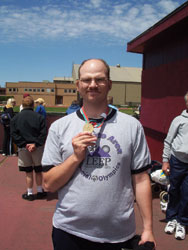 Going for the Gold
Going for the Gold
Whether it's a community event, the Special Olympics National Games or the World Games, all Special Olympics events have the same goal of offering the opportunity for a an athletic experience that will build self-esteem and improve life quality. To ensure a good level of competition and opportunity for its athletes, Special Olympics uses a specific process of divisioning its athletes.
"A person with intellectual disabilities can't really be classified or categorized by IQ or disability," says Todd. "So unlike the Paralympics, which have different class groups based on physical disability, we have the divisioning process."
A Special Olympics athlete's rise from the regional games to the World Games might vary slightly by state, but they all follow a similar model: athletes in each sport compete in preliminary events and are ranked by their performance. Then, they are grouped into divisions by those rankings, where they compete with other athletes of similar ability level. Bronze,silver and gold medals are awarded in each division. After that, each state has a certain number of participants it can send to the World Games. Some states randomly choose those representatives from the pool of gold medal winners; other states allow gold medal winners to enter applications to represent their state at the World Games.
But while gold medals are encouraging and winning is a great thing, the opportunity to compete and to participate, to achieve athletic feats they never thought possible, that is what makes a long-term, positive effect on Special Olympics athletes' lives.
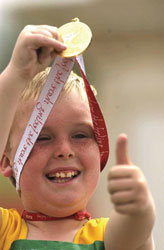 This became clear for Angie Lowe after the basketball event she coached in which her team took the gold. "This young man, one of the athletes, came up to me after we won," explains Lowe. "He said ‘I'm glad we won, but I was always told I couldn't compete. You gave me that opportunity and I'm so thankful.'"
This became clear for Angie Lowe after the basketball event she coached in which her team took the gold. "This young man, one of the athletes, came up to me after we won," explains Lowe. "He said ‘I'm glad we won, but I was always told I couldn't compete. You gave me that opportunity and I'm so thankful.'"
In November 2008, that young man accepted Dothan's Athlete of the Year award. And he has made a difference in Dothan just as much as they have for him.
To learn more about the Special Olympics, get in touch with your local Special Olympics organization at www.specialolympics.org.

